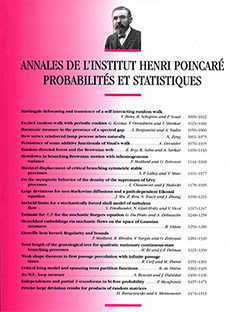Abstract
For large N, we consider the ordinary continued fraction of x=p/q with 1≤p≤q≤N, or, equivalently, Euclid’s gcd algorithm for two integers 1≤p≤q≤N, putting the uniform distribution on the set of p and qs. We study the distribution of the total cost of execution of the algorithm for an additive cost function c on the set ℤ+* of possible digits, asymptotically for N→∞. If c is nonlattice and satisfies mild growth conditions, the local limit theorem was proved previously by the second named author. Introducing diophantine conditions on the cost, we are able to control the speed of convergence in the local limit theorem. We use previous estimates of the first author and Vallée, and we adapt to our setting bounds of Dolgopyat and Melbourne on transfer operators. Our diophantine condition is generic (with respect to Lebesgue measure). For smooth enough observables (depending on the diophantine condition) we attain the optimal speed.
Nous considérons la fraction continue ordinaire de x=p/q pour 1≤p≤q≤N, ou, de manière équivalente, l’algorithme de pgcd d’Euclide pour deux entiers 1≤p≤q≤N, avec N grand et p et q distribués uniformément. Nous étudions la distribution du coût total de l’exécution de l’algorithme pour un coût additif c sur l’ensemble ℤ+* des “digits” possibles, lorsque N tend vers l’infini. Le théorème de la limite locale a été démontré par le deuxiéme auteur si c est non réseau et satisfait une condition de croissance modérée. En imposant une condition diophantienne sur le coût, nous parvenons à contrôler la vitesse de convergence dans ce théorème de la limite locale. Pour cela nous utilisons des estimées obtenues par le premier auteur et Vallée, et nous adaptons à notre problème des bornes de Dolgopyat et Melbourne sur les opérateurs de transfert. Notre condition diophantienne est générique (par rapport à la mesure de Lebesgue). Pour des observables assez régulières (par rapport à la condition diophantienne), nous obtenons la vitesse optimale.
Citation
Viviane Baladi. Aïcha Hachemi. "A local limit theorem with speed of convergence for Euclidean algorithms and diophantine costs." Ann. Inst. H. Poincaré Probab. Statist. 44 (4) 749 - 770, August 2008. https://doi.org/10.1214/07-AIHP140
Information





